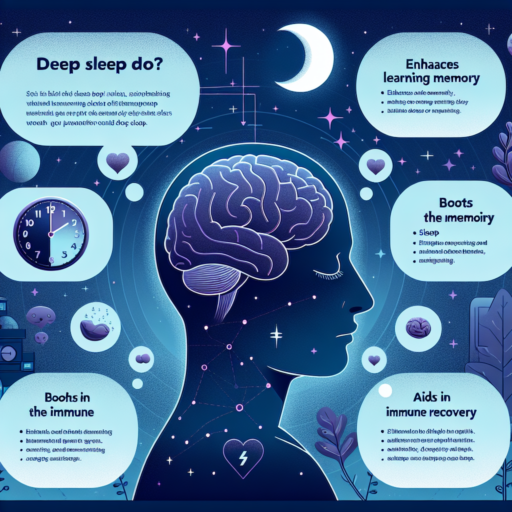What are the benefits of deep sleep?
Deep sleep, also known as slow-wave sleep, plays a crucial role in our overall health and well-being. This restorative phase of sleep is when the body repairs itself, and the brain consolidates memories and information from the day. Understanding the benefits of deep sleep can motivate individuals to adopt healthier sleep habits.
Enhanced Brain Function
During deep sleep, the brain goes through a process called memory consolidation. This is when short-term memories are transformed into long-term ones, enhancing learning and memory retention. Additionally, deep sleep helps to clear the brain of toxins that accumulate during the day, including beta-amyloid, which is associated with Alzheimer’s disease. This cleansing process supports cognitive health, reducing the risk of neurodegenerative diseases.
Physical Health and Recovery
The benefits of deep sleep extend beyond the brain, aiding in physical health and recovery. It’s during this phase that the body repairs tissues, builds bone and muscle, and strengthens the immune system. Growth hormones, essential for cell reproduction and regeneration, are primarily released during deep sleep. Consequently, getting adequate deep sleep can help to speed up recovery from physical exertion and improve overall physical performance.
Deep sleep also plays a vital role in metabolic health. Research has linked sufficient deep sleep to better insulin regulation and a reduced risk of type 2 diabetes. Furthermore, it helps to regulate hormones that control appetite, supporting weight management efforts. By prioritizing deep sleep, individuals can enjoy a myriad of health benefits that go beyond simply feeling well-rested.
How much deep sleep do you need?
Understanding the amount of deep sleep you require is crucial for maintaining optimal health and well-being. Typically, adults need to aim for a certain percentage of their total sleep time to be deep sleep. While exact needs can vary by individual, there are general guidelines that can help you determine if you’re getting enough of this restorative sleep phase.
Factors Influencing Deep Sleep Needs
- Age: Younger people generally require more deep sleep for growth and development.
- Lifestyle and Health: Active and healthy individuals might enjoy deeper, more restorative sleep cycles.
Experts suggest that adults should aim for 20-25% of their sleep to be in the deep sleep stage, which translates to approximately 1.5-1.8 hours per night, given the average adult sleep duration. However, this can vary based on several physiological and lifestyle factors.
No se han encontrado productos.
Which is better, REM or deep sleep?
Understanding the difference between REM and deep sleep stages is essential for appreciating their unique benefits. REM sleep, known for its association with vivid dreams, plays a crucial role in memory consolidation and emotional regulation. On the other hand, deep sleep, or slow-wave sleep, is primarily responsible for physical recovery, growth, and the strengthening of the immune system. Both stages are vital, but their benefits cater to different aspects of health and well-being.
REM sleep is characterized by rapid eye movement, increased brain activity, and temporary paralysis of the limbs to prevent acting out dreams. It is during this phase that the brain processes emotions, consolidates memories, and facilitates learning. The importance of REM sleep is evident in how it supports cognitive functions, including creativity and problem-solving abilities.
In contrast, deep sleep is the most regenerative phase, marked by slow brain waves, decreased heart rate, and relaxed muscles. This stage is critical for hormone regulation, including the release of growth hormone essential for growth and tissue repair. Deep sleep also aids in the detoxification of the brain, thereby playing a pivotal role in preventing neurodegenerative diseases.
What happens if you don’t get enough deep sleep?
Not getting enough deep sleep can lead to a plethora of health issues that can affect your overall quality of life. Deep sleep, also known as slow-wave sleep, is critical for physical and mental restoration. Without it, your body misses out on crucial processes that help repair and grow tissues, build bone and muscle, and strengthen the immune system. Additionally, deep sleep plays a significant role in consolidating memories, which is vital for learning new information and for emotional processing.
Impact on Cognitive Functions: Lack of deep sleep can severely impact your cognitive abilities. It can lead to decreased concentration, impaired judgment, and slowed reaction times. The brain relies on deep sleep to remove toxins that accumulate throughout the day, similar to a waste removal system. Without sufficient deep sleep, these toxins can build up, potentially contributing to the long-term risk of neurodegenerative diseases, such as Alzheimer’s and Parkinson’s.
Effects on Emotional Health: Equally important is the impact of insufficient deep sleep on emotional health. It can exacerbate feelings of stress, anxiety, and depression. Deep sleep helps to regulate emotions and stress hormones, such as cortisol. When deprived of deep sleep, your body may produce higher levels of cortisol, leading to increased stress and anxiety. Additionally, emotional regulation becomes more challenging, making it harder to cope with daily stresses in a healthy manner.




